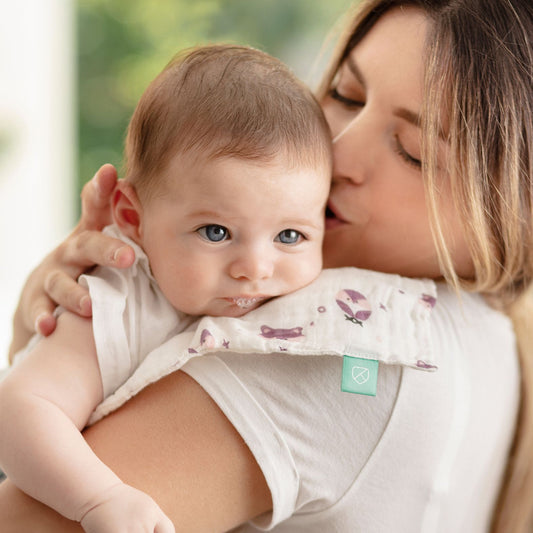Occasional vomiting is quite common in infants and children. It usually clears in a few days and isn’t anything serious to worry about. However, it’s important parents are aware of the signs to look out for which may be cause for concern. Care should be taken to ensure your baby does not become dehydrated. Read on to find out what are the causes of vomiting in babies and what can you do to look after your baby when they are being sick.
Vomiting Baby: Causes
The cause of vomiting in babies depends on their age. Generally speaking, a single bout, or two, of vomiting in one day isn’t any serious cause of alarm. Infants usually recover fully within twenty-four hours.
However, it’s important to watch out for certain signs and symptoms, which may be cause of concern and which will help you when consulting your doctor for further advice.
The most common cause of prolonged bouts of newborn vomiting may be a food allergy, milk intolerance, or gastroenteritis.
In the latter case, we are often dealing with a viral form, such as rotavirus. It is difficult for a baby who is breastfed to contract this infection, given they are only feeding from their mum's milk.
However, it’s also true that the virus can be transmitted through contact, which is why washing your hands well is so important, especially if members of your family are unwell.
Vomiting can also be a symptom of other health conditions, such as infections, intestinal pathologies, reactions to drugs, ketosis, gastroesophageal reflux disease.
This is why it’s vital to be aware of what you need to look out for, so you are able to inform your doctor about the number of vomiting episodes, the colour, the duration, and all related symptoms, so that they have all the necessary information to understand the nature of the problem.
What to do if your baby vomits
Those old home remedies for a vomiting child passed down from your grandmother, such as: lemon tea and dry biscuits, are certainly no help when it comes to a baby!
Not to worry, we'll explain what you need to do if your baby is being sick.
1. Consult your doctor
Always seek advice from your doctor on what to do, especially if your baby is less than 3 months old, has not passed urine in the last eight hours, has traces of blood in their vomit or has a temperature of more than 38 °C.
2. Continue with milk feeds
If you are still breastfeeding or formula-feeding, continue to give your infant milk. It’s very important that your baby continues to take in fluids to prevent dehydration.
3. Avoid food for a few hours
If the baby is older, it’s best to wait at least 3-4 hours after the last bout of vomiting before eating again. They should drink small sips of clear liquids, such as water, at spaced out intervals.
Fluids are important to keep your baby hydrated, but drinking more than a teaspoon of water every three or four minutes may provoke even more vomiting.
When the infant is able to tolerate clear liquids and shows no further signs of being sick, you can start to introduce light foods again and offering them regular drinks.
4. Do not use anti-nausea medication on your own initiative
Anti-nausea medication should only be used if prescribed by your doctor specifically for your baby as this type of medication is not proven to be effective or tolerated by young babies.
5. Oral Rehydration Solution
If your baby has lost a lot of fluids or shows signs of dehydration after throwing up, ask your doctor whether you should give your baby oral rehydration solution, which you can find in pharmacies.
How can you tell your child is dehydrated? A dry mouth, crying without tears, drowsiness, sunken eyes, not passing urine.
Projectile vomiting in babies after a milk feed
Why is your baby projectile vomiting after their milk? There are two possible causes for a baby vomiting after feeding.
It’s often related to the liquid consistency of the milk, and normally passes by quickly without any further issues.
It usually resolves itself once solid foods are introduced, and in the meantime it can help to hold your baby in an upright position after feeding.
Very rarely, however, it can be caused by an underdeveloped valve connecting the oesophagus to the stomach. It is therefore important to consult your doctor if your baby displays any of the following: not growing as they should, frequent bouts of restlessness and crying.
Difference between regurgitation and vomiting
Care must be taken not to confuse regurgitation and vomiting, as they are two different things.
Regurgitation is a physiological issue for infants, linked to the fact that their digestive system is not fully mature yet. It refers to the gastro-oesophageal reflux which rises up from the stomach into the oesophagus, causing the baby to “spit-up” a small amount of milk mixed with saliva.
Keeping your baby upright after a feed, either holding them in your arms or carrying them in a baby carrier may help.
Whereas vomiting usually refers to a higher volume of stomach contents being brought up and is generally preceded by nausea and tummy contractions.
If your little one is vomiting, the key is to keep calm. In most cases it’s nothing to worry about. Our advice is to consult your doctor immediately, who will be able to provide all the guidance you need to look after your baby when vomiting.








